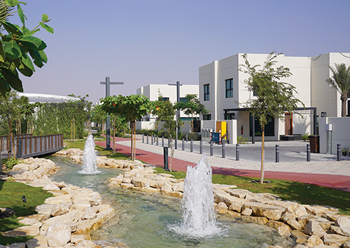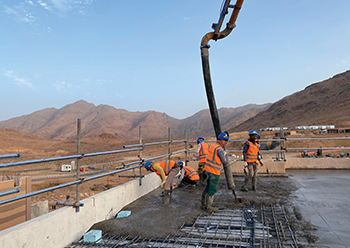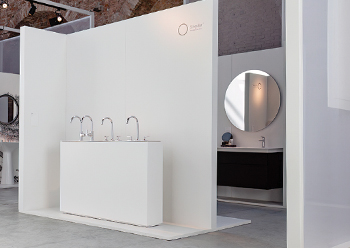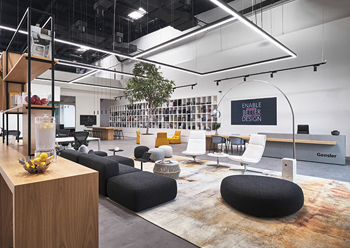
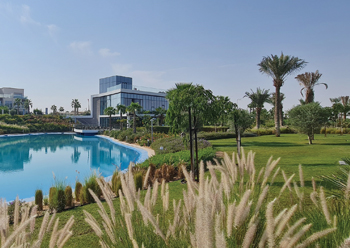 Damac Hills 2 ... a green community.
Damac Hills 2 ... a green community.
Leading Dubai-based real estate developer Damac announced late last month it is now a member of the Emirates Green Building Council (EmiratesGBC), the latest in a series of initiatives it has taken to promote the principles of sustainability and green building practices across the UAE.
As a corporate member, Damac will work closely with EmiratesGBC to drive sustainability and promote all aspects of green building in the UAE’s built environment.
“At Damac, we understand the urgency of committing to green building practices and are taking large strides in deploying best practices across our portfolio of projects,” states Hussain Sajwani, Founder and Chairman of Damac.
“We will continue pursuing partnerships that are committed to building a safer and more secure future, and believe that by combining our strengths and working hand in hand with the Emirates Green Building Council, we can create a positive and lasting impact on the environment, our communities, and the way we build,” he adds.
The announcement comes a year after the company signed up as an active member of the US Green Building Council (USGBC), the foremost coalition of leaders working to transform the way buildings are designed, built, and operated.
“Damac Properties is a pioneering name in the real estate landscape of this region. It thus becomes our responsibility to activate our management and operations strategies to facilitate an environment that contributes to a safe, secure and healthy living atmosphere,” Mohammed Tahaineh, General Manager of Damac, tells Gulf Construction in an exclusive interview.
“We have taken long strides, and will continue to do so, in adapting best building practices for all of our upcoming projects and enhance our sustainability commitments to safeguard the communities we build. We have partnered with key authorities on this path to promise a livable and thriving environment for current and future generations.”
Tahaineh cites numerous measures Damac has taken towards attaining its green goals. Among them, the group has joined the United Nations Global Compact initiative, a voluntary leadership platform for the development, implementation and disclosure of responsible business practices. It also supports the Ten Principles of the United Nations Global Compact on human rights, labour, environment and anti-corruption, thereby committing to making the UN Global Compact and its principles part of the strategy, culture and day-to-day operations of the company, and to engaging in collaborative projects that advance the broader development goals of the United Nations, particularly the Sustainable Development Goals (SDGs), he adds.
Damac has major green ambitions for its key developments in the region. For instance, the group is currently poised to be awarded a LEED (Leadership in Energy and Environmental Design) Gold certification under the LEED Cities and Communities Rating System for its third and latest master community, Damac Lagoons – aspiring to be the first in the UAE to do so.
“This community project is themed around eight key sustainability principles of circular economy, rich biodiversity, low emissions, resource efficiency, sustainable mobility, smart city, diversity and equality, and health and well-being. Land optimisation, water and energy efficiency, waste diversion and management, and recycling are at the heart of the project’s sustainability philosophy,” Tahaineh explains.
Damac Group currently has three projects, namely Ghalia, Damac 108 Tower and Suburbia, that have received Green Certificates from Dubai’s Planning and Development Department (Trakhees).
Meanwhile, as part of its strategy to ensure the comfort, convenience, and happiness of the residents of its properties, Damac has installed free green charger stations at its Damac Hills 2 master community and aims to install others in Damac Hills in collaboration with Dubai Electricity and Water Authority (Dewa). In fact, in line with Dewa’s efforts to support the use of environment-friendly electric vehicles (EV) in Dubai and its mission towards carbon emission reduction in the emirate, the developer plans to install electric vehicle chargers across all its current and upcoming projects in Dubai.
“For instance, in Zada Tower, a 26-storey building located in Business Bay, Damac plans to install six green chargers; while in Cavalli Tower, a beach-facing skyscraper overlooking Palm Jumeirah, Damac intends to install 12 green chargers as the demand from EV owners continue to increase,” Tahaineh explains.
Apart from electric charger stations, other initiatives have been taken at Damac Hills 2 in a bid to make it a greener community. According to Tahaineh, LED solar lighting is used for streetlighting; the irrigation of the community’s landscaping is carried out using recycled water that has been processed at a sewage treatment plant (STP). Furthermore, at Damac Hills, low flow water fixtures are used in common areas to reduce water consumption.
“In addition, buildings at both communities include energy recovery ventilation where fresh air handling units (FAHU) are installed. Solar water heaters have been installed in the developer’s existing villas and townhouses at the Damac Hills and Damac Hills 2 communities, while at the upcoming Damac Lagoons community, photovoltaic (PV) solar system will be used,” he adds.
Meanwhile, Damac Group has also launched a sustainability programme focused on the operations and maintenance stages of projects. The goal of this programme is to enhance all developments in the portfolio to follow international guidelines, policies, and procedures in line with numerous sustainability and environmental organisations, Tahaineh concludes.
Since its launch in 2002, Damac has delivered around 43,700 homes.

















.jpg)













 (1).jpg)














































